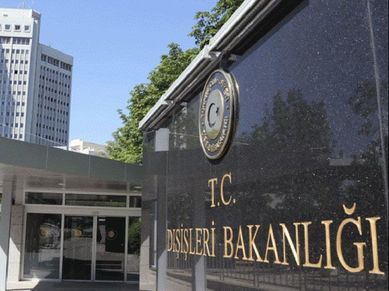Turkey warns foreign ambassadors in the Republic of Cyprus 'not to exceed their authority'

The Turkish foreign ministry is warning foreign diplomats in the Republic of Cyprus not to overstep their authority, following comments by Israeli and Egyptian ambassadors in Nicosia during a diaspora conference last week.
On Monday, Turkish Foreign Ministry Spokesperson Hami Aksoy accused the Republic of Cyprus of “disregarding the inalienable rights of Turkish Cypriots on natural resources.”
The statement came one week following remarks by Turkish Foreign Minister Mevlut Cavusoglu, who took to social media to say that Turkish Cypriots would not accept anything less than political equality in Cyprus.
“Greek Cypriots must stop acting like the sole owners of Cyprus. The fact that both sides on the island are politically equal will never change,” Cavusoglu wrote on Twitter.
But Aksoy’s statement went further, pointing fingers at comments made by foreign ambassadors in Nicosia, who spoke during an international conference of Greek Cypriot Diaspora last week.
“The remarks made by some Ambassadors during a recent conference in the Greek Cypriot Administration, in support of the unilateral hydrocarbon-related activities being conducted by the Greek Cypriots in the Eastern Mediterranean, are unwarranted,” he said.
Aksoy did not name the diplomats in his statement, except to say that his country would “recommend to the representatives of the relevant countries that they do not exceed their authority.”
According to Turkish media, the statement was a direct reference to the Israeli, Egyptian, and US ambassadors in Nicosia, who attended the Diaspora conference between July 25 and 27.
The President of the Republic of Cyprus, Nicos Anastasiades, addressed the conference where foreign ambassadors also took part in a round table discussion, offering their remarks on natural gas exploration in the Cypriot Exclusive Economic Zone (EEZ).
Ambassadors in their own words
Israeli ambassador to Nicosia Sammy Ravel, according to CNA News Agency, told the audience that he “hoped military force would not be necessary against Turkish provocations.”
Egyptian ambassador Mai Taha Mohammed Khalil also spoke on the issue, saying “we hope we don’t reach the point where we will have to use the military in the area,” while adding “we will provide any possible assistance to Cyprus.”
US Ambassador Kathleen Doherty also reiterated the US position on natural gas exploratory drilling and the rights of the Republic of Cyprus, saying that the former US secretary of state had gone to Ankara and told his counterpart that “Turkey’s behaviour was unacceptable.”
Greek Ambassador Elias Fotopoulos also spoke in the conference, saying his country remained hopeful for a positive outcome in a possible new round of peace talks on Cyprus, “as long as Turkey shows the necessary will and the international community continues to support the process.”
Ankara recently upped the ante on rhetoric regarding a possible settlement in Cyprus, reiterating its position on political equality between Turkish Cypriots and Greek Cypriots and insisting that no international agreements on Cypriot natural gas reserves could be signed without overall agreement between the two sides.
Source: Kathimerini Cyprus
On Monday, Turkish Foreign Ministry Spokesperson Hami Aksoy accused the Republic of Cyprus of “disregarding the inalienable rights of Turkish Cypriots on natural resources.”
The statement came one week following remarks by Turkish Foreign Minister Mevlut Cavusoglu, who took to social media to say that Turkish Cypriots would not accept anything less than political equality in Cyprus.
“Greek Cypriots must stop acting like the sole owners of Cyprus. The fact that both sides on the island are politically equal will never change,” Cavusoglu wrote on Twitter.
But Aksoy’s statement went further, pointing fingers at comments made by foreign ambassadors in Nicosia, who spoke during an international conference of Greek Cypriot Diaspora last week.
“The remarks made by some Ambassadors during a recent conference in the Greek Cypriot Administration, in support of the unilateral hydrocarbon-related activities being conducted by the Greek Cypriots in the Eastern Mediterranean, are unwarranted,” he said.
Aksoy did not name the diplomats in his statement, except to say that his country would “recommend to the representatives of the relevant countries that they do not exceed their authority.”
According to Turkish media, the statement was a direct reference to the Israeli, Egyptian, and US ambassadors in Nicosia, who attended the Diaspora conference between July 25 and 27.
The President of the Republic of Cyprus, Nicos Anastasiades, addressed the conference where foreign ambassadors also took part in a round table discussion, offering their remarks on natural gas exploration in the Cypriot Exclusive Economic Zone (EEZ).
Ambassadors in their own words
Israeli ambassador to Nicosia Sammy Ravel, according to CNA News Agency, told the audience that he “hoped military force would not be necessary against Turkish provocations.”
Egyptian ambassador Mai Taha Mohammed Khalil also spoke on the issue, saying “we hope we don’t reach the point where we will have to use the military in the area,” while adding “we will provide any possible assistance to Cyprus.”
US Ambassador Kathleen Doherty also reiterated the US position on natural gas exploratory drilling and the rights of the Republic of Cyprus, saying that the former US secretary of state had gone to Ankara and told his counterpart that “Turkey’s behaviour was unacceptable.”
Greek Ambassador Elias Fotopoulos also spoke in the conference, saying his country remained hopeful for a positive outcome in a possible new round of peace talks on Cyprus, “as long as Turkey shows the necessary will and the international community continues to support the process.”
Ankara recently upped the ante on rhetoric regarding a possible settlement in Cyprus, reiterating its position on political equality between Turkish Cypriots and Greek Cypriots and insisting that no international agreements on Cypriot natural gas reserves could be signed without overall agreement between the two sides.
Source: Kathimerini Cyprus




 RSS Feed
RSS Feed